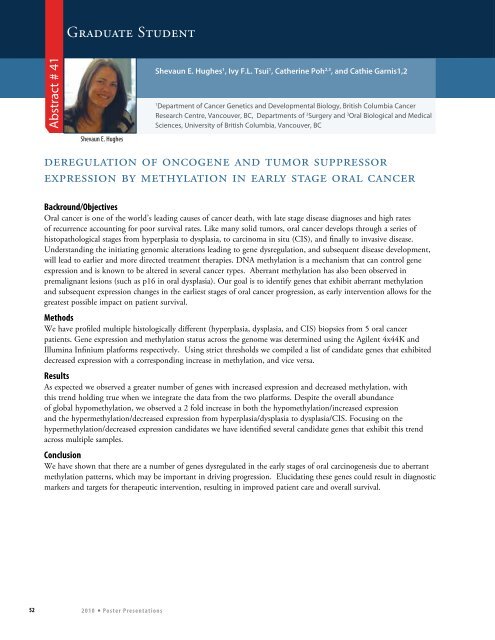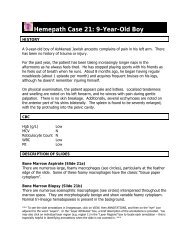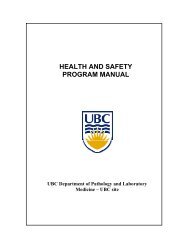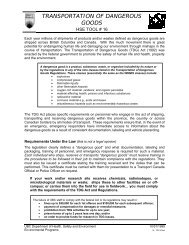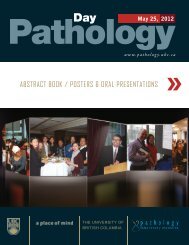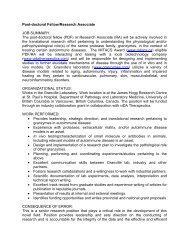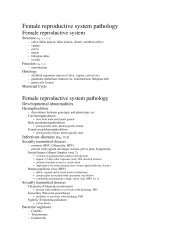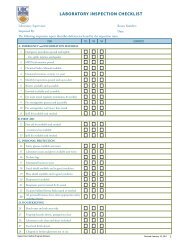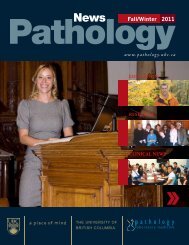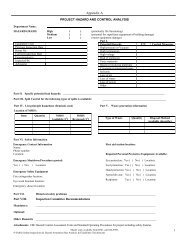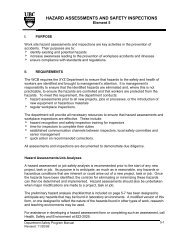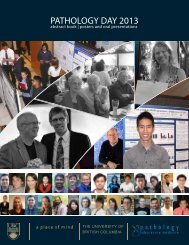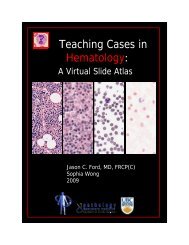Oral Presentations - Pathology and Laboratory Medicine - University ...
Oral Presentations - Pathology and Laboratory Medicine - University ...
Oral Presentations - Pathology and Laboratory Medicine - University ...
Create successful ePaper yourself
Turn your PDF publications into a flip-book with our unique Google optimized e-Paper software.
Graduate StudentAbstract # 41Shevaun E. HughesShevaun E. Hughes 1 , Ivy F.L. Tsui 1 , Catherine Poh 2,3 , <strong>and</strong> Cathie Garnis1,21Department of Cancer Genetics <strong>and</strong> Developmental Biology, British Columbia CancerResearch Centre, Vancouver, BC, Departments of 2 Surgery <strong>and</strong> 3 <strong>Oral</strong> Biological <strong>and</strong> MedicalSciences, <strong>University</strong> of British Columbia, Vancouver, BCderegulation of oncogene <strong>and</strong> tumor suppressorexpression by methylation in early stage oral cancerBackround/Objectives<strong>Oral</strong> cancer is one of the world’s leading causes of cancer death, with late stage disease diagnoses <strong>and</strong> high ratesof recurrence accounting for poor survival rates. Like many solid tumors, oral cancer develops through a series ofhistopathological stages from hyperplasia to dysplasia, to carcinoma in situ (CIS), <strong>and</strong> finally to invasive disease.Underst<strong>and</strong>ing the initiating genomic alterations leading to gene dysregulation, <strong>and</strong> subsequent disease development,will lead to earlier <strong>and</strong> more directed treatment therapies. DNA methylation is a mechanism that can control geneexpression <strong>and</strong> is known to be altered in several cancer types. Aberrant methylation has also been observed inpremalignant lesions (such as p16 in oral dysplasia). Our goal is to identify genes that exhibit aberrant methylation<strong>and</strong> subsequent expression changes in the earliest stages of oral cancer progression, as early intervention allows for thegreatest possible impact on patient survival.MethodsWe have profiled multiple histologically different (hyperplasia, dysplasia, <strong>and</strong> CIS) biopsies from 5 oral cancerpatients. Gene expression <strong>and</strong> methylation status across the genome was determined using the Agilent 4x44K <strong>and</strong>Illumina Infinium platforms respectively. Using strict thresholds we compiled a list of c<strong>and</strong>idate genes that exhibiteddecreased expression with a corresponding increase in methylation, <strong>and</strong> vice versa.ResultsAs expected we observed a greater number of genes with increased expression <strong>and</strong> decreased methylation, withthis trend holding true when we integrate the data from the two platforms. Despite the overall abundanceof global hypomethylation, we observed a 2 fold increase in both the hypomethylation/increased expression<strong>and</strong> the hypermethylation/decreased expression from hyperplasia/dysplasia to dysplasia/CIS. Focusing on thehypermethylation/decreased expression c<strong>and</strong>idates we have identified several c<strong>and</strong>idate genes that exhibit this trendacross multiple samples.ConclusionWe have shown that there are a number of genes dysregulated in the early stages of oral carcinogenesis due to aberrantmethylation patterns, which may be important in driving progression. Elucidating these genes could result in diagnosticmarkers <strong>and</strong> targets for therapeutic intervention, resulting in improved patient care <strong>and</strong> overall survival.52 2 0 1 0 * P o s t e r P r e s e n t a t i o n s


